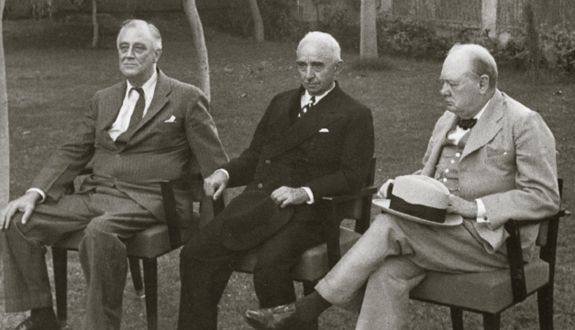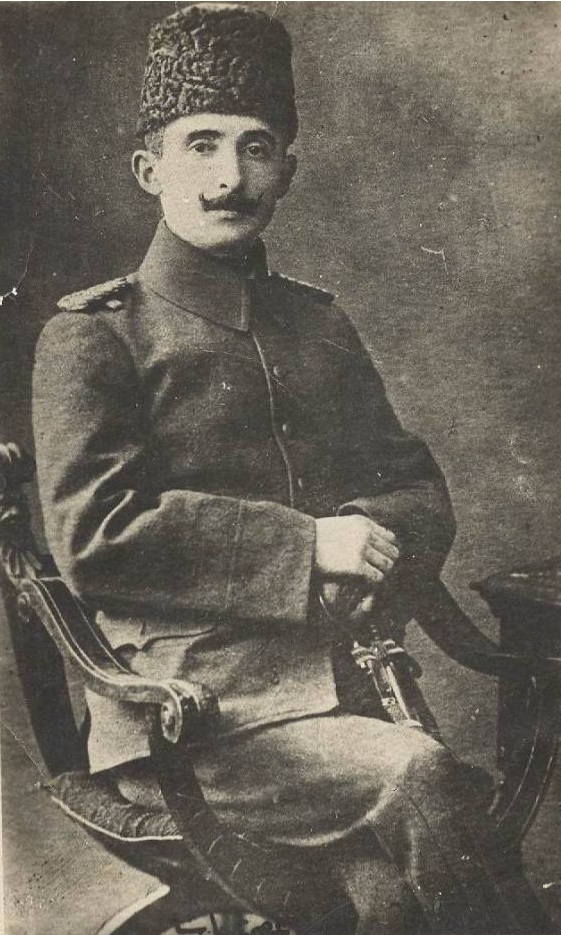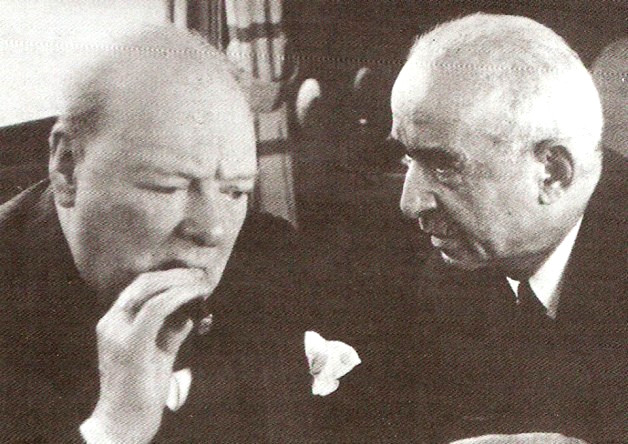İsmet İnönü
İsmet İnönü
 Turkey
Turkey Ottoman Empire
Ottoman EmpireMustafa İsmet İnönü (born 24 September 1884 - died 25 December 1973) was a Turkish army officer and statesman who served as the second president of Turkey from 11 November 1938 to 22 May 1950, and its prime minister three times: from 1923 to 1924, 1925 to 1937, and 1961 to 1965.
Mustafa İsmet was born in 1884 in İzmir in the Aidin Vilayet to Hacı Rershit and Cevriye (later Cevriye Temelli). Hacı Reşit was retired after serving as director of the First Examinant Department of Legal Affairs Bureau of the War Ministry (Harbiye Nezareti Muhakemat Dairesi Birinci Mümeyyizliği). A member of the Kürümoğlu family of Bitlis, İsmet's father was born in Malatya. According to its members studying the ancestral background of the family, Kürümoğlus were of Turkish origin, while secondary sources refer to the family as of Kurdish descent. His mother was a daughter of Müderris Hasan Efendi who belonged to the ulema and was a member of a Turkish family of Razgrad (present-day Bulgaria). İsmet was the family's second child, he had three brothers including the family's first child, Ahmet Midhat, two younger brothers Hasan Rıza and Hayri (Temelli), as well as a sister Seniha (Otakan). Due to his father's assignments, the family moved from one city to another.
İsmet İnönü completed his primary education in Sivas and graduated from Sivas Military Junior High School (Sivas Askerî Rüştiyesi) in 1894. He then studied at Sivas School for Civil Servants (Sivas Mülkiye İdadisi) for a year. İsmet graduated from the Imperial School of Military Engineering in 1903 as lieutenant gunnery officer, and entered the Military Academy to graduate as a first rank staff captain on September 26, 1906.
İnönü graduated from the War Academy as first in his class in 1906 and was appointed to the 2nd Army, 8th Regiment in Edirne with the rank of captain. He joined the Committee of Union and Progress while serving in this position.
He became an adjutant major in 1908 and served in the Operations Army which suppressed the rebellion known as the 31 March Incidents (13 April 1909).
He joined the operation to suppress the Yemen Rebellion between 1910 and 1913. He drew attention with his successful services coupled with his professional attitude in the border problems and the agreements made with rebels. When he worked together with Atatürk as the Army Corps Commander on the Caucasian Front in the World War I, they developed friendship as well as shared ideas on the future of the country. Mustafa İsmet Bey, who later fought on the Syrian Front, became the closest colleague of Mustafa Kemal Atatürk during the War of Independence.
After participating in the first convention of the Turkish Grand National Assembly (TBMM) on 23 April 1920 as Edirne representative, he was appointed as the Defense Minister on 3 May 1920 in the first cabinet. Colonel İsmet Bey was also appointed as the Commander of the Western Front in addition to his duties in the Parliament and the Cabinet. He played an important role in the suppression of the Çerkez Ethem Rebellion as well as various other domestic rebellions with the newly-established national army. İsmet İnönü stopped the advancement of the Greek forces into Anatolia during January and April of 1921, the battles which were later named after him.
His successes during the First İnönü battle earned him the rank of Brigadier General. Following the victories in the Battle of Sakarya River and the Great Attack, he represented the TBMM in the Mudanya armistice talks. İnönü became the Foreign Minister in 1922 and due to his extensive experience in the diplomatic negotiations he was sent to Lausanne Peace Conference as the Foreign Minister and head of the Turkish delegation.
İsmet Paşa who defended the Turkish interests rigorously in these talks signed the Lausanne Treaty that made the recognition and independence of the Republic of Türkiye possible.
After the declaration of the Republic, İnönü served as the first Prime Minister of Türkiye while also acting as the Deputy Chairman of the Republican People's Party (CHP).When the Surname Law was introduced in 1934 he was given the last name İnönü by Atatürk and remained as the Prime Minister until 1937.
İsmet İnönü who was elected as the second President of Türkiye by the TBMM after the death of Atatürk in 1938 also became the Chairman of the CHP. He received the title of ‘National Chief' following his election to the head of the CHP permanently in the Convention of the party that was held unexpectedly on 26 December 1938.
İnönü who managed to keep Türkiye out of the disastrous World War II was influential in the transition to the multi-party regime in the aftermath of the war.
With the 1950 national elections CHP left the power to the Democratic Party while İsmet İnönü continued to serve as the Chairman of the CHP until 1960. Following the 27 May 1960 military intervention he was elected as a member of the Constitutional Assembly and was appointed as the Prime Minister on 10 November 1961.After leaving this post, he continued his political life in the TBMM. In 1972 when the group that İnönü supported was defeated by Bülent Ecevit's list, İnönü resigned from the Parliament as well as his position in the CHP.
In accordance with the Constitution, İsmet İnönü served in the Senate of the Republic until his death on 25 December 1973. He got married to Mevhibe Hanım in 1916 and they had three children.



